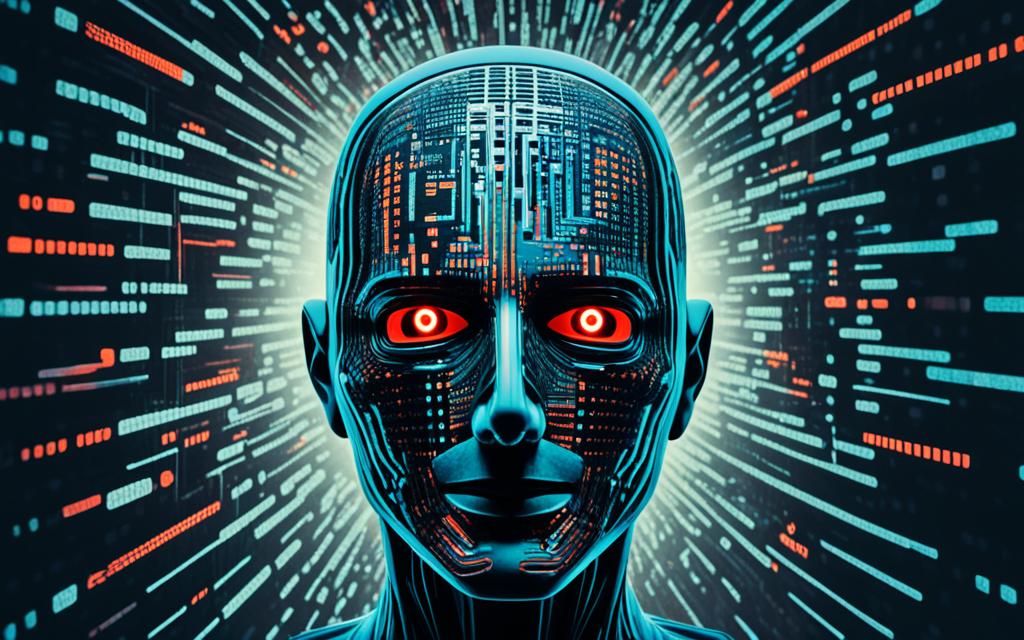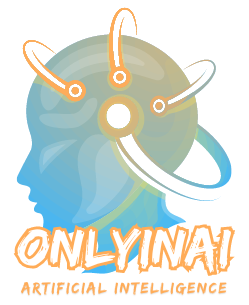Did you know 85% of Americans use AI every day? This fact shows how fast AI is becoming part of our lives. As AI gets smarter, it brings both great benefits and big risks we must face.
Many tech leaders are talking about the dangers of AI. Geoffrey Hinton, known as the “Godfather of AI,” left Google to warn us about AI risks. He shares concerns with Elon Musk and over 1,000 other experts who want to slow down AI experiments. They say these risks are too big for society and humanity.
AI can take jobs, invade privacy, and show bias. As AI gets more into our lives, we need to know these risks. It’s important to use AI wisely and develop it responsibly.
Key Takeaways
- 85% of Americans use AI-powered products daily
- Tech leaders warn about the dangers of rapidly advancing AI
- Job displacement is a significant concern as AI automates tasks
- Privacy and data security risks are increasing with AI adoption
- Algorithmic bias in AI systems can perpetuate social inequalities
- Responsible AI development is crucial to mitigate potential dangers
Introduction to AI and Its Rapid Growth
Artificial intelligence has moved from science fiction to our everyday lives. It started in the 1950s and now helps us search, shop, and choose entertainment. This growth makes us think about the ethics and impact of AI on society.
AI Definition and Applications
AI means machines that think like humans. It’s used in things like voice assistants, suggesting what we might like, and self-driving cars. As AI gets better, it’s changing how we work and live.
Increasing AI Sophistication
Recent advances, like ChatGPT, show how much AI can do now. These systems can write emails, summarize meetings, and even make art. This fast growth is thrilling but also makes us worry.
| AI Capability | Past (2010) | Present (2023) |
|---|---|---|
| Language Processing | Basic translation | Human-like conversations |
| Image Recognition | Simple object detection | Detailed scene analysis |
| Decision Making | Rule-based systems | Complex problem-solving |
Tech Leaders’ Concerns
As AI gets better, tech leaders are worried. Elon Musk and others talk about the dangers. They stress the importance of making AI responsibly. This shows we need to think deeply about AI’s ethics and effects on society.
“AI is a fundamental risk to the existence of human civilization.” – Elon Musk
Job Displacement and Economic Impacts
The rise of AI brings both good and bad changes to the job market. As AI gets better, we see jobs changing in many industries. This change makes us worry about ai control issues and unintended ai effects.
By 2030, AI could change up to 30% of work hours in the U.S. economy. Black and Hispanic workers face a higher risk of losing their jobs. The finance sector expects AI to cut 300 million full-time jobs worldwide.
AI might create 97 million new jobs by 2025, but many workers might not have the right skills. This gap between job needs and worker skills is a big issue we need to fix.
“AI is not just changing how we work, but redefining entire industries. We must prepare for this shift to ensure a smooth transition for workers and the economy.”
Old jobs are also changing a lot. Jobs like law, accounting, and medicine are facing big changes from AI. These changes could lead to job losses and changes in industries. We need to take steps to handle ai control issues well.
- Implement reskilling programs to prepare workers for AI-enhanced roles
- Develop policies to support those displaced by AI automation
- Encourage collaboration between humans and AI to create new job opportunities
As we move forward with AI in the job market, we must tackle both the problems and chances it brings. By doing this, we can aim for a future where AI helps us, not replaces us.
Lack of Transparency and Explainability in AI Systems
AI systems are getting more complex, making us worry about their transparency and accountability. As they get better, it’s harder for developers and users to understand how they make decisions.
The Black Box Problem
AI models often act like “black boxes,” making choices without explaining why. This lack of transparency can cause biases and mistakes in important areas. For instance, AI hiring tools might not give reasons for rejecting candidates, leaving job seekers upset and companies missing out on talent.
Challenges in Understanding AI Algorithms
AI algorithms are too complex for humans to easily understand. This makes it hard to spot and fix mistakes, which could lead to bad outcomes in areas like healthcare or finance.
| Challenges | Impacts |
|---|---|
| Complex algorithms | Difficulty in error detection |
| Lack of interpretability | Reduced trust in AI systems |
| Rapid AI advancements | Outdated regulations |
The Need for Explainable AI
Explainable AI (XAI) wants to make AI systems more clear and accountable. By giving clear reasons for AI decisions, XAI can help build trust, improve decisions, and tackle ethical issues. It’s key for responsible AI use in different industries.
“Explainable AI is not just a technical challenge, but a societal imperative. We must strive for transparency to build trust in AI systems and ensure their responsible use.”
Social Manipulation and Misinformation

AI technology is changing how we use social media and share information. AI algorithms on platforms like TikTok can make some views more popular. This might spread biased or wrong information, making it hard to trust news and media.
One big worry is deepfakes. These are AI-made images and videos that look real but aren’t. Bad people can use them to spread lies and propaganda easily.
“The ability to create realistic fake content is a game-changer in the world of information warfare.”
Experts say we need AI tools to detect fake content and teach people to be more critical online. Users should know how to spot when they’re being manipulated and think about what they see online.
| AI Risk | Potential Impact | Mitigation Strategy |
|---|---|---|
| Deepfakes | Spread of false information | AI detection tools |
| Algorithm bias | Amplification of extreme views | Transparent AI systems |
| Social manipulation | Erosion of trust in media | Digital literacy education |
As AI gets better, we must tackle these issues to keep our information safe and honest. This is key for a healthy online world and clear public discussions.
Privacy Concerns and Data Security Risks
AI systems are becoming more common, which means more worries about privacy and security. They collect a lot of personal data. This raises questions about how this data is kept safe and used.
AI’s Data Collection Practices
AI tools collect data from many sources to get better. This includes things like what you browse online, where you are, and your voice. While this makes things more convenient for you, it also raises privacy risks.
Potential for Data Breaches
Having a lot of data in AI systems makes them more vulnerable to breaches. If one attack is successful, it could reveal sensitive info of millions. For instance, a bug in ChatGPT let some users see others’ chat histories, showing how vulnerable AI platforms can be.
Balancing Personalization and Privacy
AI makes things more personalized, but it means sharing more personal info. Users must think about how much they’re okay with sharing for these perks. This is a big part of the debate on AI privacy and security.
“The concentration of data in AI tools, combined with limited regulation, poses significant risks to individual privacy and data security.”
In the United States, there’s no strong federal law to protect people from AI privacy issues. As AI keeps getting better, finding a balance between new tech and protecting data is a big challenge for developers, lawmakers, and users.
Dangers of Using AI in Critical Decision-Making

AI is becoming more important in making big decisions. It’s used in everything from war to healthcare, affecting lives in big ways. This change brings both good and bad sides.
In the military, AI beats human pilots in flight simulations. This makes people wonder if machines should decide when to kill or not. It’s a tough question.
In healthcare, AI helps diagnose diseases and suggest treatments. It looks at a lot of data fast. But, mistakes could harm patients badly.
Legal and financial areas also face risks with AI. AI systems can make court decisions or handle big investments. If they fail or show bias, the risks are huge.
“The integration of AI in critical decision-making processes demands a delicate balance between leveraging its capabilities and maintaining human oversight.”
Finding the right balance is key. We need to use AI’s power but keep human ethics and judgment in charge. As AI gets better, solving these problems is more important for our safety and well-being.
AI Bias and Fairness Issues
AI bias and fairness are big concerns in today’s fast-changing AI world. These issues go beyond simple gender or racial biases. They touch many parts of our lives and society.
Sources of Bias in AI Systems
Bias in AI comes from many places. The data used to train AI often shows society’s prejudices. AI algorithms can make these biases worse. And, if AI developers are not diverse, they might miss seeing biases.
Impacts on Marginalized Groups
Biased AI can really hurt marginalized communities. For instance, speech recognition AI often has trouble with certain accents. This can leave some groups out of services they need.
In housing, biased AI can make discrimination worse. It can limit chances for some people.
| AI Application | Potential Bias Impact |
|---|---|
| Speech Recognition | Difficulty understanding diverse accents |
| Facial Recognition | Higher error rates for people of color |
| Hiring Algorithms | Discrimination against certain genders or ethnicities |
Efforts to Address AI Bias
To fix AI bias, we need to try different things. Making AI development teams more diverse helps spot and fix biases. It’s also key to use more languages in training data. Many top chatbots only use 100 out of 7,000 languages.
Groups are also working on making AI systems more open and clear. This helps find and fix biases better.
“Fairness in AI is not just a technical challenge, but a societal imperative that requires ongoing vigilance and collaboration across disciplines.”
Ethical Considerations and Societal Impact
AI technology is getting more advanced, bringing up complex ethical issues. The worry of AI being used in chemical weapons or war is real. We need to think carefully about how to use AI’s good sides while avoiding its bad ones.
AI affects how we interact with each other every day. Using AI more might make us lose touch with real human connections. This could change how we build relationships and communities.
AI can also trick and deceive us, which is a big worry. Things like deepfakes and false information spread fast, threatening truth and trust. AI’s effect on our lives is huge, and we need to be careful.
“The ethical use of AI is not just a technological challenge, but a societal imperative.”
We need strong ethical rules and limits for AI. These should help us keep up with innovation and make sure AI helps people, not hurts them. By dealing with ethical issues early, we can make sure AI makes our future better.
- Establish clear ethical guidelines for AI development
- Promote transparency in AI decision-making processes
- Invest in education to increase AI literacy among the public
- Encourage diverse perspectives in AI design and implementation
The impact of AI on society is big and complex. By facing ethical issues directly, we can use AI’s good sides safely. The way forward needs teamwork, looking ahead, and a promise to use AI responsibly.
Conclusion
AI is a powerful tool that comes with both benefits and risks. Tech leaders worry about its fast growth and potential dangers. Job loss, privacy issues, and biased decisions are major concerns.
AI’s lack of transparency is a big problem. We need to make AI more explainable so we can understand its decisions. Social manipulation and spreading false information through AI are threats to our online world.
To use AI safely, we must focus on responsible development and ethics. We need to tackle bias, protect privacy, and think about how AI affects society. By staying informed and demanding accountability, we can ensure AI benefits us all safely and fairly.


